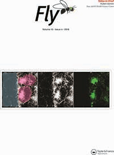
JOURNAL OF NEUROGENETICS
Scope & Guideline
Pioneering Insights into Neurogenetics and Brain Disorders
Introduction
Aims and Scopes
- Genetic Mechanisms in Neurodevelopment:
The journal emphasizes research on the genetic underpinnings of neural development, including studies on specific gene functions and mutations that affect neuronal growth and differentiation. - Behavioral Genetics:
A core area of focus is the relationship between genetics and behavior, particularly in model organisms like Drosophila. This includes investigations into how genetic variations influence behaviors such as foraging, mating, and response to environmental stressors. - Neurogenetic Disorders:
The journal publishes research on various neurogenetic disorders, examining the genetic factors involved in conditions such as spinal muscular atrophy, Charcot-Marie-Tooth disease, and hereditary spastic paraplegia. - Molecular and Cellular Neurobiology:
Research on molecular pathways and cellular mechanisms in neurobiology is a key focus, often employing techniques such as CRISPR/Cas9, gene expression analysis, and bioinformatics to dissect complex neurobiological processes. - Interdisciplinary Approaches:
The journal encourages interdisciplinary research that combines genetics, neurobiology, and computational methods, fostering innovative approaches to studying neural functions and disorders.
Trending and Emerging
- Long Non-Coding RNAs in Neurobiology:
Research on the roles of long non-coding RNAs (lncRNAs) in neurogenetic disorders has gained traction, indicating a growing recognition of their significance in gene regulation and neural function. - Impact of De Novo Mutations:
There is an increasing focus on the impact of de novo mutations in various neurodevelopmental disorders, highlighting their importance in understanding the genetic architecture of these conditions. - Neuroinflammation and Neurodegeneration:
Emerging studies are exploring the relationship between neuroinflammation and neurodegenerative diseases, reflecting a trend towards understanding the complex interactions between genetic factors and inflammation in the nervous system. - Advanced Computational Techniques:
The use of advanced computational methods, including machine learning and deep learning, is trending in the analysis of genetic data and behavioral phenotypes, showcasing the journal's commitment to integrating technology in neurogenetics research. - Ethical Considerations in Genetic Research:
As genetic research expands, there is a growing emphasis on the ethical implications of neurogenetic studies, particularly concerning human subjects and genetic privacy, indicating a maturation of the field.
Declining or Waning
- Classical Genetic Studies in Non-Model Organisms:
Research focusing on classical genetic approaches in non-model organisms has decreased, possibly due to the rise of molecular techniques and model organisms like Drosophila and mice that provide more robust experimental frameworks. - General Behavioral Studies Without Genetic Context:
There appears to be a waning interest in broad behavioral studies that do not explicitly connect to genetic factors. The journal's focus has shifted towards more integrative studies that link genetics directly to specific behaviors. - Historical Perspectives and Memoirs:
While the journal has published several memoirs and historical reflections, the frequency of such contributions has declined, indicating a potential shift towards more empirical research and away from personal narratives within the scientific community.
Similar Journals

Open Biology
Fueling scientific exploration with unrestricted access.Open Biology is a prestigious, interdisciplinary journal published by the Royal Society that has been paving the way in the fields of Biochemistry, Genetics and Molecular Biology, Immunology, and Neuroscience since its inception in 2011. Catering to a global audience of researchers, professionals, and students, Open Biology operates under an open access model, facilitating the unrestricted dissemination of high-quality research findings. With a current impact factor that positions its categories in the top quartile (Q1) and impressive Scopus rankings—evidencing its influence and reach—this journal serves as a vital platform for innovators and scientific inquiries aimed at advancing our understanding of life sciences. The journal's commitment to publishing cutting-edge research makes it an essential resource for those at the forefront of scientific exploration.

HUMAN MOLECULAR GENETICS
Exploring the genetic blueprint of health and disease.HUMAN MOLECULAR GENETICS, published by Oxford University Press, is a premier journal in the field of genetics, with an established reputation since its inception in 1992. With an impressive Q1 ranking in various categories, including Genetics, Clinical Genetics, and Molecular Biology, this journal engages a diverse readership by reporting significant advances in our understanding of the genetic basis of human health and disease. The journal has achieved notable rankings within Scopus, particularly in Clinical Genetics, making it a key resource for professionals and researchers aiming to stay at the forefront of genetic research. Although it operates under a traditional access model, it remains committed to disseminating high-quality research that informs clinical practice and enhances knowledge in the genetic field. The journal's impact factor signifies its crucial role in shaping contemporary genetic research and its application in medicine. As the field continues to evolve, HUMAN MOLECULAR GENETICS serves not only as an academic repository but also as a vital platform for innovation and discussion among students, researchers, and clinicians.

FLY
Fostering Collaboration in Insect ResearchFLY, an esteemed journal published by Taylor & Francis Inc, is a leading resource in the field of Insect Science, offering cutting-edge research and insights into the biology, ecology, and management of flies and related insect species. With an impressive Impact Factor reflecting its high citation and publication standards, FLY serves as a vital platform for researchers and practitioners aiming to advance their understanding of this diverse and crucial group of organisms. The journal, which has been publishing since 2007 and is set to continue until 2024, is recognized as a Q1 category journal in its discipline, ranked 58 out of 181 in Agricultural and Biological Sciences, placing it in the 68th percentile of the field. Although currently non-open access, the journal is committed to disseminating valuable knowledge and fostering collaboration among scientists, offering unparalleled opportunities for professionals, researchers, and students to engage with transformative science in the insect realm.

JOURNAL OF BIOSCIENCES
Navigating the Landscape of Biosciences Since 1979JOURNAL OF BIOSCIENCES, published by the Indian Academy of Sciences, has established itself as a pioneering platform in the fields of biosciences, encompassing diverse research areas such as agricultural and biological sciences, biochemistry, genetics, molecular biology, and medicine. With an impressive trajectory since its inception in 1979, the journal has achieved notable recognition, securing a Q1 ranking in Agricultural and Biological Sciences and maintaining its place in the top quartiles for Biochemistry and Medicine as of 2023. With Scopus rankings placing it at #32 in General Agricultural and Biological Sciences and #65 in General Biochemistry, Genetics, and Molecular Biology, the journal reaches the 85th and 70th percentiles respectively, reflecting its impact and relevance in current scientific discourse. Although it does not offer open access, the JOURNAL OF BIOSCIENCES remains crucial for researchers, professionals, and students dedicated to advancing knowledge and innovation within the biosciences, providing a vibrant forum for high-quality research and comprehensive reviews.

INTERNATIONAL JOURNAL OF HUMAN GENETICS
Advancing the Frontiers of Human GeneticsINTERNATIONAL JOURNAL OF HUMAN GENETICS is a distinguished publication dedicated to advancing knowledge in the fields of genetics and molecular biology. Published by KAMLA-RAJ ENTERPRISES, this journal explores critical developments and research findings from 2008 to 2016, though its coverage in Scopus has since been discontinued. With an ISSN of 0972-3757 and an E-ISSN of 2456-6330, the journal aimed to foster scholarly dialogue and serve as a resource for researchers, professionals, and students engaged in human genetics. While the journal holds a modest ranking in categories such as Biochemistry and Genetics, it remains a vital source for exploring niche topics within the realm of human genetics. Researchers interested in genetic screening, gene therapy, and clinical genetics will find valuable insights herein. Despite its pause in indexing, the journal continues to contribute to the academic discourse by disseminating critical research that bridges gaps in understanding human genetics.

BIOCHEMICAL GENETICS
Illuminating Pathways in Biochemistry and GeneticsBIOCHEMICAL GENETICS, published by Springer/Plenum Publishers, is a prominent journal in the fields of biochemistry, genetics, and molecular biology, with a substantial impact on the scientific community since its inception in 1967. The journal holds a significant position within various academic quartiles, ranking Q2 in Ecology, Evolution, Behavior and Systematics, and Q3 in Biochemistry, Genetics, and Medicine (miscellaneous), among others, demonstrating its diverse and interdisciplinary reach. With an ISSN of 0006-2928 and an E-ISSN of 1573-4927, it is recognized for contributing critical research insights and methodologies that drive the fields of biochemical genetics forward. Although it is not an Open Access journal, it provides vital access options and resources for researchers globally, facilitating the dissemination of knowledge across institutions. Positioned within the competitive landscape of Scopus rankings, it maintains respectable standings across its focused areas, making it an invaluable resource for researchers, professionals, and students seeking to deepen their understanding of genetic mechanisms and biochemical processes.

GENES & GENETIC SYSTEMS
Advancing the Frontiers of Genetic ResearchGENES & GENETIC SYSTEMS, an esteemed journal published by the Genetics Society of Japan, serves as a vital platform for the dissemination of innovative research within the fields of genetics, molecular biology, and medicine. Established in 1996 and based in Mishima, Shizuoka, Japan, this journal has actively contributed to the academic community, fostering collaboration and knowledge sharing among researchers and professionals. The journal’s impact can be seen through its category quartiles, which reflect its position in Genetics, Molecular Biology, and Medicine, and while it currently ranks in Q4 in Genetics and Q3 in Medicine (miscellaneous), it is poised for growth as it continues to publish pivotal studies. With a commitment to open access, GENES & GENETIC SYSTEMS ensures that research findings are freely accessible to the global scientific community, promoting a more inclusive approach to knowledge distribution. This journal is essential for students, researchers, and professionals seeking to stay informed of advancements in genetic research and its implications for the broader field of medicine.

ACTA BIOCHIMICA POLONICA
Shaping the Future of Biochemistry with Every PublicationACTA BIOCHIMICA POLONICA (ISSN: 0001-527X, E-ISSN: 1734-154X) is a distinguished journal published by the ACTA BIOCHIMICA POLONICA in Poland, with a rich history dating back to 1955. As a prominent platform for disseminating research, it currently holds a Category Quartile of Q3 in the fields of Biochemistry, Genetics, and Molecular Biology, reflecting its commitment to advancing knowledge in these critical areas. This journal is indexed in Scopus, ranking 124 out of 221, placing it in the 44th percentile among general biochemistry, genetics, and molecular biology journals. Although it does not operate under an open-access model, ACTA BIOCHIMICA POLONICA remains a vital resource for researchers, professionals, and students seeking to delve into the latest developments and discoveries in biochemistry and molecular biology. Its strategic focus on contemporary topics ensures that it plays an essential role in shaping future scientific inquiries and fostering collaboration across various disciplines.

Molecular Genetics Microbiology and Virology
Championing High-Quality Research in Molecular BiologyMolecular Genetics Microbiology and Virology is an esteemed academic journal published by PLEIADES PUBLISHING INC, specializing in the complex interplay of genetics, microbiology, and virology. Established in 2007, this journal serves as a crucial platform for researchers and professionals committed to advancing our understanding of infectious diseases and molecular biology. Despite its current categorization in Q4 across several fields, the journal aims to evolve and foster significant discourse within the scientific community. While not an open access journal, it provides essential insights and high-quality research articles that contribute to the body of knowledge in molecular genetics and related disciplines. Located in the vibrant research landscape of New York, USA, the journal also encourages new submissions that address cutting-edge research topics and emerging trends in infectious diseases, thereby appealing to both emerging scholars and seasoned experts alike.

MOLECULAR BIOLOGY
Unlocking the Secrets of Life at the Molecular LevelMOLECULAR BIOLOGY, published by PLEIADES PUBLISHING INC, serves as a vital repository for the dissemination of innovative research within the fields of biochemistry, genetics, and molecular biology. With an ISSN of 0026-8933 and an E-ISSN of 1608-3245, this journal has been a mainstay in the scientific community since its inception, embracing its deep historical roots from 1971 to the present. Recognized for its qualitative contributions, MOLECULAR BIOLOGY is ranked in the Q3 quartile for Biophysics and Q4 for Structural Biology, placing it among select journals in its domain. Researchers and students alike benefit from its rigorous peer-reviewed articles, which focus on all aspects of molecular mechanisms and interactions. The journal's inclusion in prestigious databases underlines its commitment to academic excellence. The editorial board is dedicated to fostering the sharing of influential findings, making it an essential resource for advancing knowledge and innovation in molecular biology.